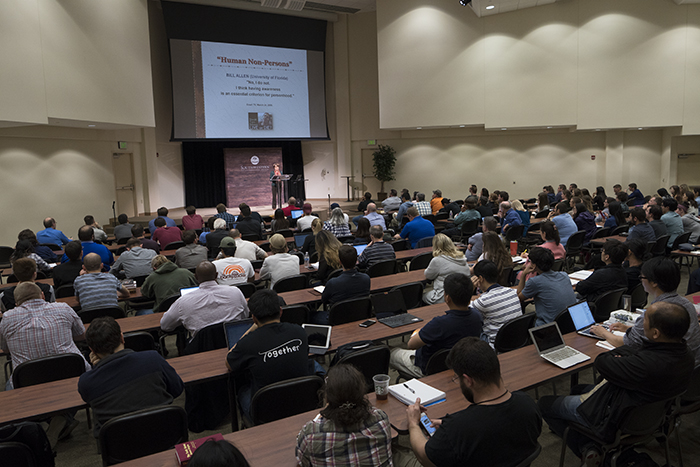Apologetics conference provides principles for answering any worldview

With multiple worldviews populating modern society, how do Christians engage the culture? In answer to this question, during Southwestern Seminary’s annual Stand Firm Apologetics Conference, March 23-24, author and apologetics professor Nancy Pearcey outlined some of the principles necessary for answering any worldview.
Speaking during one the conference’s plenary sessions, Pearcey, who teaches at Houston Baptist University, stated that one of the ways Christians can interact with another worldview is to ask basic questions to test its theory. For example, “Does it fit the facts and fit the world?” and, “Is it logically coherent—that is, does it hold together logically?”
In testing the external facts, Pearcey said, secular worldviews will undercut themselves and fall apart for one reason: “It is a part of creation, so it will never explain the whole. As a result, it will always lead to cognitive dissonance.”
Many of today’s prominent thinkers, Pearcey continued, actually acknowledge that their philosophy does not fit the “real world,” and they frequently admit that it is actually “difficult to live with.” She explained that humanity often gives these people evidence of a contradicting philosophy.
Next, Pearcey said one must test other theories against “internal logic.” She said, “I propose to you that every idol leads to internal contradiction precisely because of its reductionism. You see, when a human person is reduced to something less than fully human, that includes our cognitive capacities.”
The final principle Pearcey shared is to make a case for Christianity. Whereas all other worldviews, including the increasingly popular postmodernism and evolutionary psychology, are prone to “commit suicide,” Christianity does not do this, she said.
“Christianity is not reductionist. It starts with a rational Creator and therefore there is no need to reduce rationally to something less than reason.” In fact, Pearcey continued, all other philosophers and thinkers have ultimately borrowed from Christianity and its view of knowledge.
In summary, Pearcey said, “The case we need to make is that the only foundation for human dignity is to begin with a someone, not a something.” Reading from Romans 1, where Paul says he is not ashamed of the Gospel, Pearcey said that he can have that confidence for a reason: Christianity offers what every person wants. “Christianity gives a basis for affirming all the distinctive human qualities as real,” Pearcey said.
Referencing her book Finding Truth: 5 Principles for Unmasking Atheism, Secularism, and Other God Substitutes, Pearcey said that its ideas and apologetic approach allow one to look at where other worldviews get things right. She explains that even when people focus only on “parts of creation,” they are likely to uncover some genuine truths.
“So a biblical worldview enables Christians to approach every other worldview with a free and respectful attitude,” Pearcey said. Understanding that Christians can glean something of value from differing perspectives, she continued, “We can enjoy the best works of any culture; we can delight in the artistry; and we can glean insight from science and philosophy. All the while, what we need to be doing is making the case that whatever is genuinely good and true finds its home in Christianity.”
Pearcey was one of the Stand Firm conference’s two keynote speakers, the other being Tim McGrew of West Michigan University. In addition to the plenary sessions, the conference featured three series of workshops: “Reasons for God,” “Outreach,” and “Advanced Apologetics.”
Southwestern professors Paul Gould, Ross Inman, Keith Loftin, and Travis Dickinson each presented in these workshops—Gould spoke on “Beauty and Imagination in Apologetics,” Loftin on “Why Christian Physicalism is a Bad Idea,” Inman on “The Evidential Value of a Transformed Life,” and Dickinson on “Is the God of the Old Testament a Moral Monster?” Other breakout speakers included John Depoe, Tawa Anderson, and Allen Hainline.



